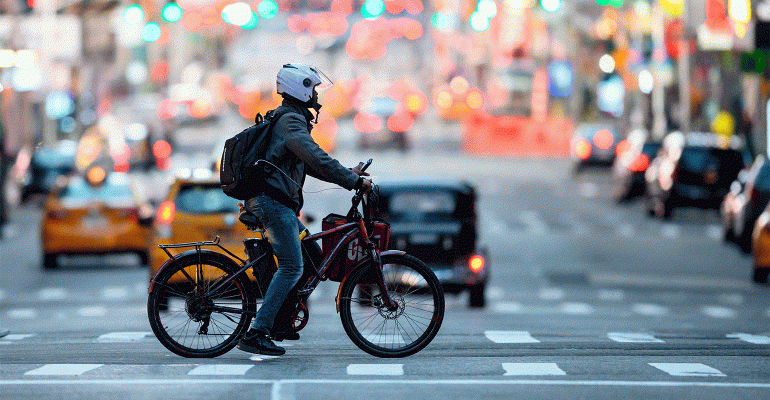Seattle is capping third-party delivery fees at 15%, a decision made by emergency order to reduce the financial burden restaurants face when forced to pay “exorbitant” fees to companies like Uber Eats, Grubhub, Postmates and DoorDash, city officials said.
The emergency order to cap fees became effective Friday, April 24, and will remain in place until restaurants can reopen for dine-in services, according to the order issued by Seattle Mayor Jenny A. Durkan and council members M. Lorena González and Lisa Herbold.
“Delivery services have been a lifeline for our restaurants during this unprecedented time. Unfortunately, some third-party delivery services are charging exorbitant commission fees, which exacerbates the financial hardship many restaurants are already experiencing,” Seattle Durkan said in a statement.
Seattle joins San Francisco, which in mid-April temporarily capped third-party delivery fees at no more than 15%. Other cities are poised to follow suit as the restaurant industry puts pressure on third-party delivery companies to reduce profit-hurting commission fees during the COVID-19 crisis.
On Wednesday, the New York City Council will host a Zoom public hearing to consider capping third-party delivery fees at 10%. A Los Angeles councilmember has also asked the city to draft an ordiance to cap restaurant fees at 15%. In Chicago, a council member has proposed a 5% cap.
Commission fees, which can be as high as 30%, pay largely for two main costs: presence on a platform’s marketplace or app and the costs of last-mile logistics. The former helps lower profile restaurants leverage a third-party delivery company’s marketing to drive order volume.
Grubhub said it would comply with the orders in both cities and declined to comment further.
DoorDash and Uber Eats said they would comply with the mandates; however, both companies emphasized that they have been allocating resources to help independent restaurants.
Earlier this month, San Francisco-based DoorDash said it would cut by 50% its commission fees for independent restaurants that have five or fewer locations on the DoorDash app. The deal is also offered by sister brand Caviar.
That includes “cutting commissions in half for more than 415 small restaurants in Seattle through May to help give local restaurants the additional revenue they need to survive,” the company said in a statement issued to Nation’s Restaurant News.
“We’re disappointed that, in the midst of this crisis and when food delivery is more essential than ever, the city [Seattle] has instead imposed arbitrary caps that can cut off a lifeline for many consumers and have the unintended consequence of reducing sales for restaurants when they in fact need them most,” DoorDash said.
Those arguing against capping fees say order volumes are likely to go down for independent restaurants because they won’t be able to market themselves as aggressively as national chains on delivery platforms; also, consumers might have to pay higher prices to offset revenue lost from commissions.
“Regulating the commissions that fund our marketplace—particularly during these unprecedented times—forces us to radically alter the way we do business, sets a far-reaching precedent in a highly competitive market, and could ultimately hurt those that we’re trying to help the most: customers, small businesses and delivery people,” Uber Eats told NRN.
Postmates commissions are privately negotiated agreements that reflects the services “like paying and providing benefits to delivery couriers, marketing, customer service, courier support, exposure to new customers, and insurance.”
“Commissions are not 'fees,' they are the main source of revenue for our company and they are how we pay for the services that we provide to businesses and our customers,” Postmates said in a statement sent to NRN. “Arbitrarily setting on-demand delivery prices has real consequences that undermine our ability to operate, fund relief efforts and benefit programs for merchants, couriers and customers, and kills the whole industry’s ability to provide the services restaurants need to stay open during this national emergency.”
Seattle's order prohibits third-party companies from reducing driver compensation rates to make up for the fee losses as a result of the Seattle fee cap mandate.
For our most up-to-date coverage, visit the coronavirus homepage.
Learn lessons in leadership during a crisis from our panel of experts on Friday, May 1.
Contact Nancy Luna at [email protected]
Follow her on Twitter: @fastfoodmaven
Update, April 27, 2020: This story was updated to provide additional comments from third-party delivery companies.

